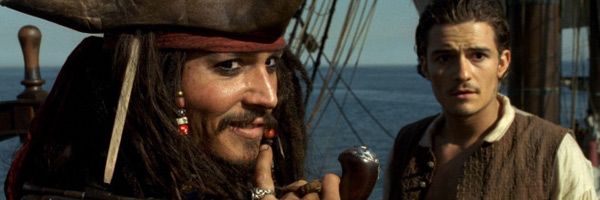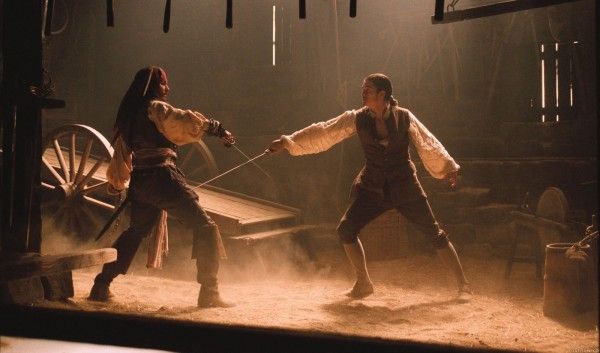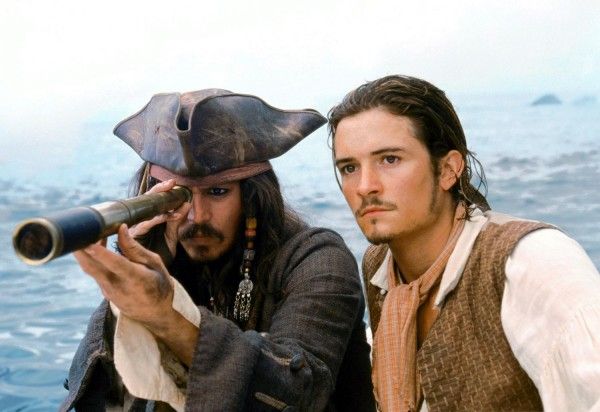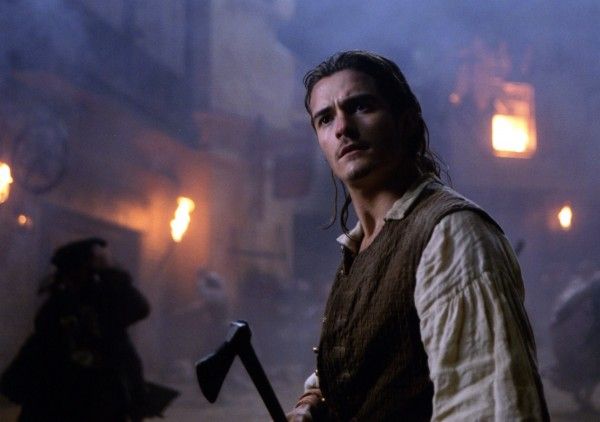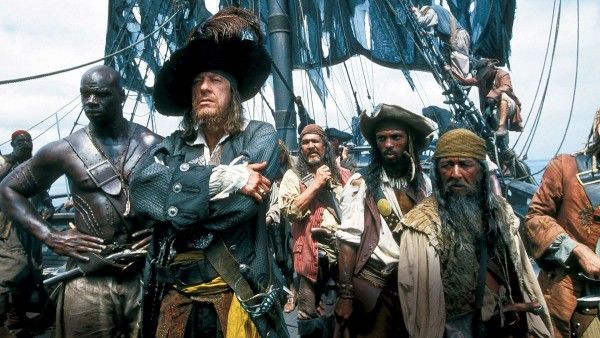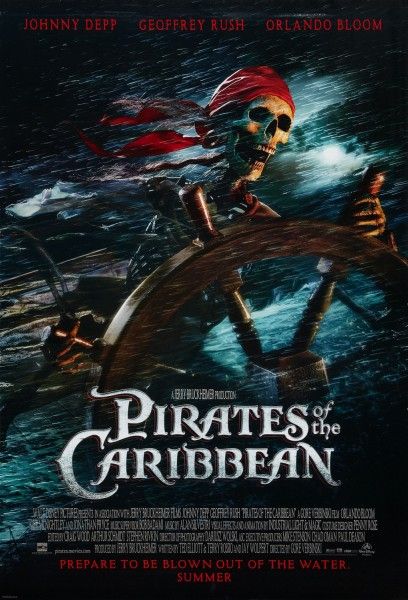The moviegoing landscape is absolutely awash in “buzz.” Good buzz, bad buzz, Oscar buzz, career-ending buzz. It’s a beehive out there, and while the advent of the internet and social media has made the “Did you hear this?” conversation absolutely never-ending, the industry has pretty much never not been flooded with early word-of-mouth. Indeed, Pirates of the Caribbean: The Curse of the Black Pearl opened in theaters 15 years ago today, and the conversation surrounding Disney’s theme park adaptation was anything but hopeful.
But the first Pirates of the Caribbean film also stands as a great reminder that bad buzz doesn’t always mean a movie is destined for failure. In fact, bad buzz can be completely false—a poor game of telephone that fuels speculation, only for the film to actually come out and not just turn out fine, but launch one of the biggest franchises of the 21st century.
In the early 2000s, Walt Disney Pictures decided to mine its theme park attractions for feature film source material. The idea was that a popular Disney World or Disneyland ride could be turned into a successful film, which would then spur interest in the parks—the circle of profit, so to speak. The first feature film based on a theme park attraction was Tower of Terror, which was a Made for TV movie that aired on ABC, but performed well enough to keep this idea of theme park adaptations going. Then came the Brian De Palma-directed Mission to Mars in 2000 (released through Disney’s Touchstone label) and the box office bomb The Country Bears in 2002.
During this time, Disney was also deep in development on a Pirates of the Caribbean movie, but the script was a tough one to nail down. After a number of drafts that envisioned Will Turner as a prison guard who releases Jack Sparrow to help rescue Elizabeth Swan from the notorious Captain Blackheart, producer Jerry Bruckheimer hired writers Ted Elliott and Terry Rossio to take a stab at it. Elliott and Rossio saw an opportunity to finally make the supernaturally-tinge pirate movie they’d been kicking around for a decade, and the duo suggested adding a supernatural curse to the story. Yes folks, not only would Disney be making a film based on the Pirates of the Caribbean ride, it would be a supernatural pirate movie.
With this idea in tow, in May 2002 Disney hired Gore Verbinski to direct, who had shown versatility in his previous films MouseHunt, The Mexican, and The Ring. Development continued as they searched to find the perfect Jack Sparrow, but then The Country Bears opened in July and Disney CEO Michael Eisner tried to shut the project down before it could even begin, fearful the idea of adapting theme park attractions into movies had already been tarnished. But Verbinski told his team to keep working, and Eisner was subsequently turned around after looking at some concept art—although he asked the filmmakers to roll back some of the more overt references to the actual ride.
So here we have a movie based on a theme park ride that’s also a pirate movie—a genre that had been dead since 1995’s Cuttthroat Island—and then the very public failure of The Country Bears. Early buzz was not great for Pirates at this time, and filming hadn’t even begun yet.
Production brought its own bad buzz to the project. Johnny Depp was cast in the role of Jack Sparrow, a character that was envisioned as a Burt Lancaster-type—a cocky pirate along for the ride. You have to remember that in 2002, Depp was far from an international superstar. He had plenty of experience leading his own projects, but it was usually either dark dramas like The Ninth Gate and Blow or outlandish character pieces like Ed Wood and Fear and Loathing in Las Vegas. So when Depp debuted his extremely off-kilter take on Jack Sparrow, Disney executives started sweating bullets. This was more a Keith Richards impression than a Burt Lancaster character, and Depp’s radical risk was rocking the boat of a project that was already on thin ice. After watching dailies, Eisner reportedly went so far as to exclaim that Depp was ruining the film, but Depp held strong in his conviction and Verbinski and Bruckheimer backed the actor’s ambitious choices.
Not only were insiders buzzing about Depp’s odd performance, but the production schedule of Pirates had to be rushed in order to meet its release date, further adding fuel to the “bad buzz” fire. By the time the film’s July 2003 bow was approaching, the summer box office had already seen a number of hits from X2 to Bruce Almighty, and Disney itself had just launched the box office smash Finding Nemo in May. But June brought disappointment in the form of 2 Fast 2 Furious and, especially, Hulk—a film audiences went into expecting fun in the vein of Spider-Man, but discovered was actually an angst-filled, dark drama from director Ang Lee.
And so Verbinski’s joyous, adventuresome, and teensy bit frightening Pirates of the Caribbean: The Curse of the Black Pearl was primed to come at just the right time—if only audiences could be convinced to come along for the ride. There was significant pushback against the very idea of this movie at the time, and almost everyone expected it to flop. It opened to $46.6 million and reviewers found themselves pleasantly surprised. But the real success of Pirates was in its continued box office success. It fell just 27% in its second weekend, grossing $34 million opposite the highly anticipated opening weekend of Bad Boys II—a sure sign that positive word of mouth had gotten out. It ultimately grossed over $650 million worldwide.
And thus a franchise was born. Pirates was a hit and did extremely well on home video to boot, which led Disney to greenlight two further sequels at once, enlisting Verbinski to complete a trilogy. While the sequels weren’t greeted with the same universal praise (I still contend they’re great), Dead Man’s Chest broke Spider-Man’s record for the highest opening weekend in history, standing as a testament to the success of the first Pirates and interest in seeing more from Jack, Will, and Elizabeth.
But the buzz was bad! Indeed, all the signs pointed to Pirates of the Caribbean: The Curse of the Black Pearl being a complete and utter disaster, but in hindsight we can see how fear and details taken out of context fueled this bad buzz fire. Something truly groundbreaking can’t be created without taking a risk, and the filmmaking process is fluid—you’re gonna have your good days and your bad days, but you put your faith in the filmmakers and performers to deliver a final product that’s worth your time and investment.
With the Twitter Machine in full effect, it’s far easier for a crew member or executive’s assistant to leak out-of-context details that then spread like wildfire. Sure, sometimes the bad buzz turns out to be warranted, but the lesson learned from Pirates of the Caribbean: The Curse of the Black Pearl is to take it all with a grain of salt until the finished film is released.

